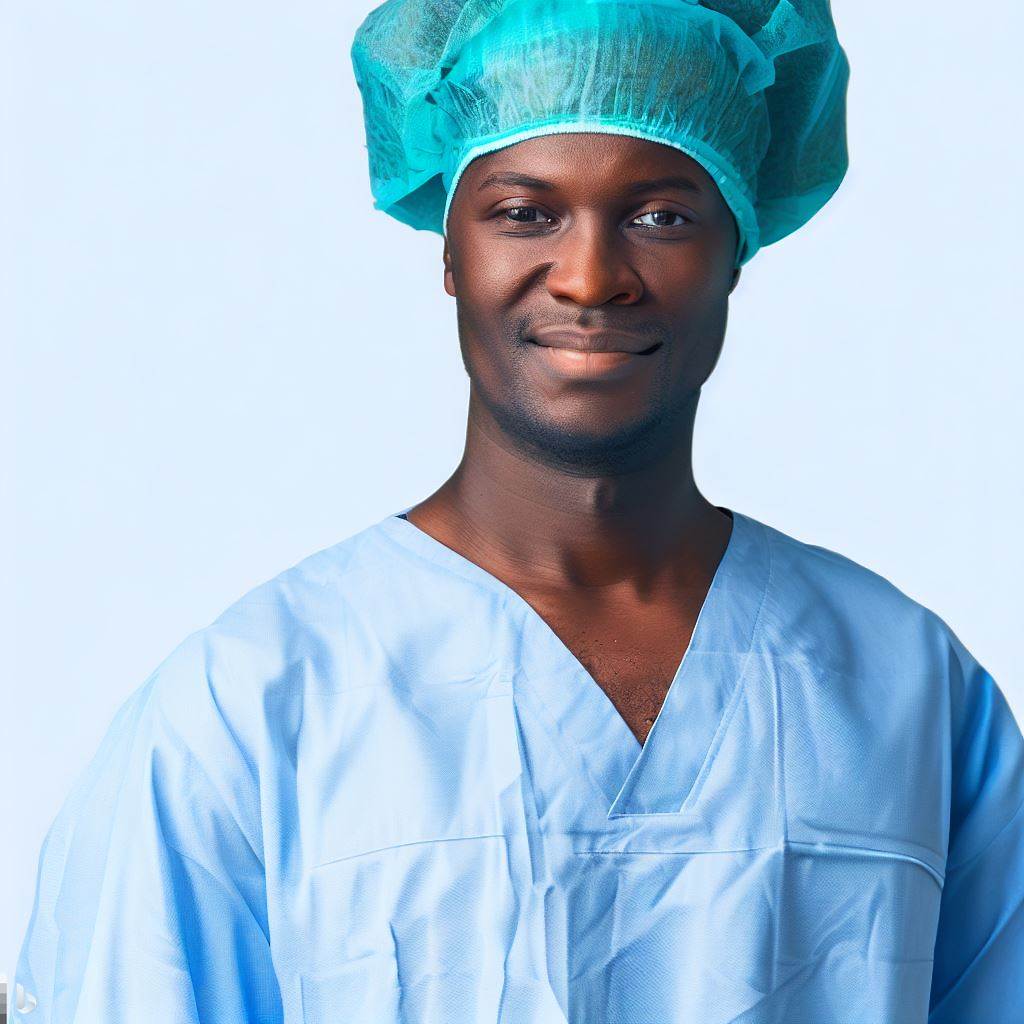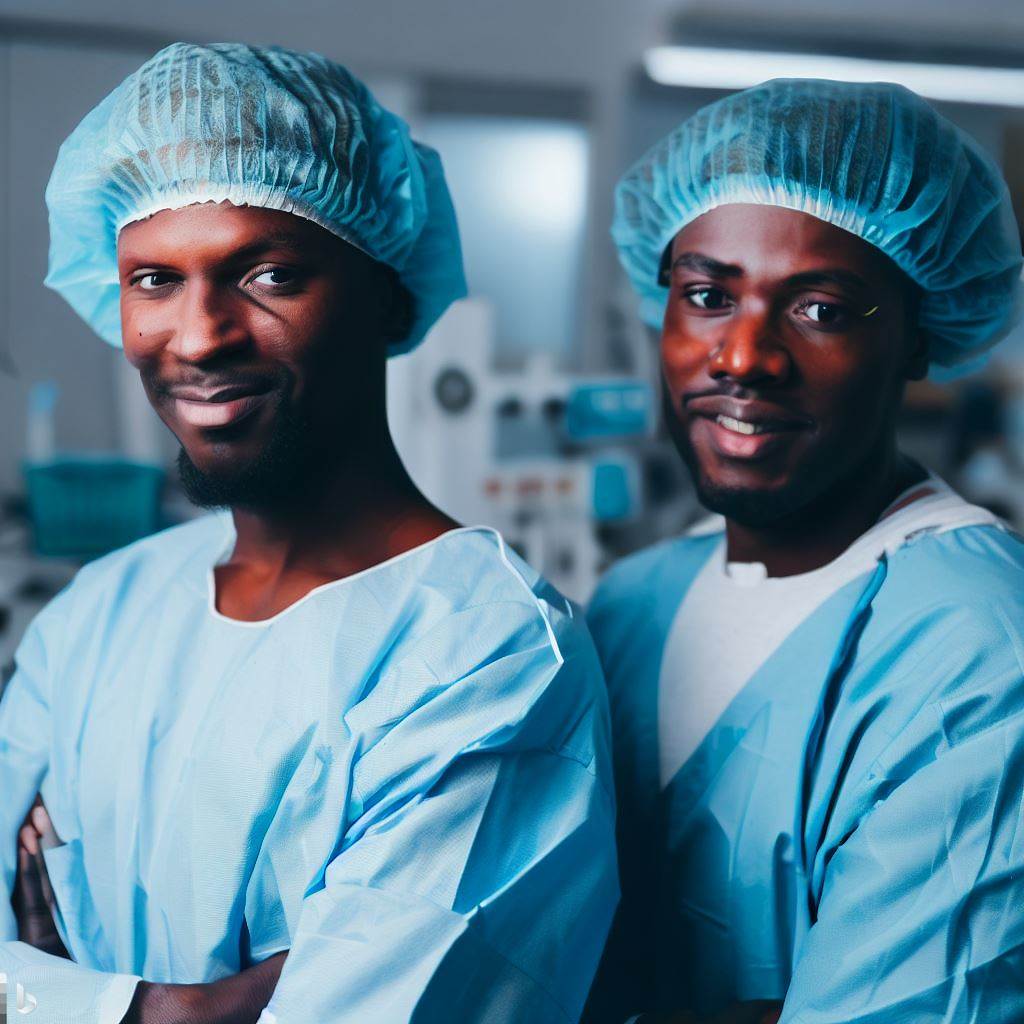Introduction
Importance of key skills for surgeons in Nigeria
In order to excel as a surgeon in Nigeria, it is essential to possess certain key skills. These skills not only determine the success of a surgeon but also contribute to the overall healthcare system in the country.
Brief overview of the Nigerian healthcare system
The Nigerian healthcare system faces several challenges including a shortage of skilled healthcare professionals and inadequate infrastructure.
Surgeons play a critical role in addressing these challenges and delivering quality healthcare services to the Nigerian population.
Technical Skills
A surgeon in Nigeria requires a wide range of technical skills to excel in their profession. These skills are essential for providing high-quality care and improving patient outcomes.
Mastery of medical knowledge and surgical techniques
One of the key skills that a surgeon must possess is a deep understanding of medical knowledge and surgical techniques.
This includes a comprehensive understanding of anatomy, physiology, and pathology, as well as the ability to apply this knowledge in a practical setting.
Surgeons must be able to diagnose and treat a variety of conditions, ranging from common ailments to complex diseases.
To excel as a surgeon in Nigeria, it is crucial to stay updated with the latest advances in medicine and surgical procedures.
This requires continuous learning and professional development, attending conferences, workshops, and engaging in research activities.
Surgeons must be adaptable and open to incorporating new techniques and technologies into their practice.
Proficiency in utilizing advanced surgical tools and equipment
In addition to mastering medical knowledge, surgeons must also possess proficiency in utilizing advanced surgical tools and equipment.
This includes handheld instruments, laparoscopic devices, and robotic-assisted systems. Surgeons must be skilled in using these tools effectively and efficiently, ensuring optimal outcomes for their patients.
Proficiency in utilizing advanced surgical tools and equipment requires hands-on training and practice.
Surgeons must be able to handle complex instruments with precision, ensuring minimal invasiveness and maximum efficacy.
Regular training programs and workshops are essential for surgeons to enhance their technical skills in this area.
Transform Your Career in Nigeria
Discover unmatched expertise with our personalized Career Consulting service. Navigate Nigeria’s job market with a strategy tailored just for you.
Get StartedAbility to interpret diagnostic tests and imaging results accurately
Another important technical skill for a surgeon in Nigeria is the ability to interpret diagnostic tests and imaging results accurately.
Surgeons often rely on these tests to diagnose and plan appropriate treatments for their patients.
Accurate interpretation of diagnostic tests and imaging results requires a keen eye for detail and a thorough understanding of the underlying medical conditions.
Surgeons must be able to analyze and interpret complex images, such as X-rays, CT scans, and MRIs, to derive meaningful information.
This skill is vital for making informed decisions and developing effective treatment plans.
Surgeons can improve their ability to interpret diagnostic tests and imaging results by regularly reviewing cases, seeking second opinions, and collaborating with radiologists and other specialists.
Continuous feedback and self-reflection are crucial for enhancing this technical skill.
In the end, excelling as a surgeon in Nigeria requires a strong foundation in technical skills.
Mastery of medical knowledge and surgical techniques, proficiency in utilizing advanced surgical tools and equipment, and the ability to interpret diagnostic tests and imaging results accurately are essential for providing high-quality care and ensuring positive patient outcomes
Continuous learning, hands-on training, and collaboration with other healthcare professionals are all vital for maintaining and enhancing these technical skills throughout a surgeon’s career.
Read: Training and Certification for Surgeons in Nigeria
Communication Skills
Effective listening and empathy towards patients
Communication skills play a crucial role in the success of a surgeon in Nigeria. By effectively listening and showing empathy towards patients, surgeons can establish a strong rapport and gain their trust.
This leads to better patient satisfaction and overall outcomes.
Surgeons should actively listen to patients’ concerns, fears, and expectations. Showing empathy helps patients feel valued, understood, and encourages open communication.
Clear and concise communication with patients, families, and colleagues
Clear and concise communication is another essential skill for surgeons. Being able to communicate complex medical information in a way that patients can easily understand is vital for successful treatment.
Additionally, communicating with families and colleagues in a clear and concise manner improves coordination and avoids misunderstandings that can compromise patient care.
Surgeons should use simple and understandable language to explain diagnoses, treatment options, and potential risks involved.
Keeping patients and their families well-informed helps them make informed decisions.
Strong interprofessional collaboration and teamwork
Surgeons in Nigeria also need to possess strong interprofessional collaboration and teamwork skills.
Collaborating with other healthcare professionals, such as nurses, anesthesiologists, and technicians, ensures smooth patient care.
It requires effective communication, mutual respect, and understanding of each team member’s role and responsibilities.
Surgeons should work collaboratively with other healthcare professionals, respecting their expertise and actively participating in team discussions.
Effective teamwork ensures seamless coordination and optimal patient outcomes. Developing and improving these communication skills can be achieved through various means.
Surgeons can participate in communication skills workshops or training programs, learn from experienced mentors, and engage in self-reflection and continuous improvement.
Publish Your Professional Profile, Business or Brand
Showcase your expertise, gain trust, and boost visibility instantly on Professions.ng.
Publish NowFurthermore, technology can also aid in enhancing communication skills. The use of electronic medical records (EMR) facilitates seamless information sharing among healthcare professionals.
Surgeons can utilize telemedicine to communicate and follow up with patients in remote areas.
Overall, effective communication skills are crucial for a surgeon’s success in Nigeria.
It not only leads to better patient satisfaction and outcomes but also fosters a positive work environment and enhances interprofessional collaboration.
Surgeons should continuously strive to develop and refine their communication skills to excel in their profession and provide the best possible care to their patients.
Read: Surgeon Profession in Nigeria: An In-Depth Analysis
Decision-making and Critical Thinking Skills
A surgeon in Nigeria must possess strong decision-making and critical thinking skills to excel in their profession.
These skills are essential for accurate diagnosis, treatment planning, emergency situations, and evaluating the risks and benefits of surgical procedures.
Analytical skills for accurate diagnosis and treatment planning
Surgeons need to have excellent analytical skills to gather and interpret medical information accurately.
They must analyze patient symptoms, medical history, and diagnostic test results to make an accurate diagnosis.
Analytical skills help in formulating effective treatment plans tailored to each patient’s specific needs.
Ability to make quick and practical decisions during emergency situations
Surgeons face unpredictable emergency situations that require immediate decision-making. They must possess the ability to assess rapidly changing circumstances and make quick decisions.
These decisions may involve choosing the most appropriate surgical intervention to save a patient’s life.
Aptitude in evaluating risks and benefits of surgical procedures
Surgeons need to carefully evaluate the risks and benefits of surgical procedures before proceeding. This evaluation helps in determining the likelihood of success and potential complications.
An aptitude for risk assessment ensures that surgeons can make informed decisions for the well-being of their patients.
Overall, decision-making and critical thinking skills are crucial for surgeons in Nigeria.
These skills enable accurate diagnosis, effective treatment planning, quick decision-making during emergencies, and evaluation of risks associated with surgical procedures.
Surgeons who excel in these areas can provide optimal care to their patients and contribute to the advancement of medical practice in the country.
Read: Impact of Technology on the Surgery Practice in Nigeria
Adaptability and Resilience
Ability to handle high-pressure environments with grace
As a surgeon in Nigeria, one of the key skills needed to excel is adaptability and resilience. In the field of surgery, one often encounters high-pressure environments, especially during emergencies.
It is crucial for a surgeon to remain calm and composed, making decisions quickly and efficiently.
Flexibility to adapt to changing medical advancements and technologies
Another important aspect of being a successful surgeon in Nigeria is the ability to adapt to changing medical advancements and technologies.
The field of medicine is constantly evolving, and it is essential for surgeons to stay updated with the latest developments.
This includes learning new surgical techniques, understanding new equipment, and staying informed about emerging treatments.
Resilience to manage long working hours and challenging cases
Surgeons in Nigeria often face long working hours and challenging cases, which require immense resilience.
The nature of their work demands long hours in the operating room, sometimes stretching into the night.
Moreover, they encounter complex and critical cases that require extensive concentration and expertise.
Being resilient allows surgeons to persevere through difficult situations and deliver the best possible patient care.
To excel in these areas, surgeons in Nigeria can develop and enhance their adaptability and resilience through various strategies.
- Continuous education and professional development: By actively engaging in continuous education, surgeons can stay updated with the latest medical advancements and developments.
Attending conferences, workshops, and seminars helps in expanding their knowledge and gaining new skills. - Building a strong support network: Surrounding oneself with a supportive network of colleagues and mentors can significantly contribute to adaptability and resilience.
Discussing cases, seeking advice, and sharing experiences with peers can help in overcoming challenges and coping with high-pressure environments. - Practicing self-care: It is crucial for surgeons to prioritize self-care to maintain their overall well-being and mental resilience.
Taking regular breaks, engaging in hobbies, and seeking emotional support when needed are essential self-care practices. - Developing problem-solving skills: Building strong problem-solving skills enables surgeons to handle unexpected situations with ease.
Understanding the root cause of complex cases and developing effective solutions helps in adapting to challenging scenarios.
In essence, adaptability and resilience are key skills needed for surgeons in Nigeria to excel.
Handling high-pressure environments with grace, adapting to emerging medical advancements, and managing long working hours and challenging cases are crucial aspects of being a successful surgeon.
By actively developing these skills, surgeons can provide the best possible patient care and contribute to the advancement of the medical field in Nigeria.
Read: Expat Surgeons in Nigeria: Opportunities and Challenges

Leadership and Management Skills
Effective leadership in surgical teams and healthcare settings
As a surgeon in Nigeria, it is crucial to possess effective leadership skills to lead surgical teams.
Success in surgery is a collective effort, and a strong leader can motivate team members, ensure clear communication, and optimize patient outcomes.
Strong organizational and time management skills
The ability to organize and manage time efficiently is essential for surgeons in Nigeria. Surgery requires strict adherence to schedules, meticulous planning, and effective coordination of resources.
Strong organizational and time management skills ensure smooth operations and minimize potential complications.
Business acumen for managing surgical departments efficiently
In addition to surgical expertise, surgeons in Nigeria need to develop business acumen to effectively manage surgical departments.
This includes financial management, resource allocation, and strategic planning to improve efficiency, productivity, and quality of care.
Leadership and management skills play a pivotal role in a surgeon’s success in Nigeria.
Whether leading a surgical team, managing time and resources, or overseeing a surgical department, these skills are fundamental for career advancement and providing optimal patient care.
Publish Your Professional Profile, Business or Brand
Showcase your expertise, gain trust, and boost visibility instantly on Professions.ng.
Publish NowRead: How to Become a Diagnostic Medical Sonographer in Nigeria
Continuous Learning and Professional Development
A commitment to ongoing education is essential for surgeons in Nigeria to excel in their profession. Surgeons must stay updated with the latest medical advancements to provide the best possible care.
Attending conferences, workshops, and research activities is crucial for professional development. Participation in such events allows surgeons to learn from experts in the field and exchange knowledge.
Interacting with peers and colleagues at conferences fosters collaborations and enhances surgical skills.
Surgeons should actively seek opportunities to broaden their knowledge and refine their surgical techniques.
Continuous learning ensures that surgeons are equipped to face new challenges and deliver improved patient outcomes.
Another important aspect of professional development is the pursuit of specialization in a specific surgical field.
Surgeons can choose to specialize in areas like cardiac surgery, orthopedics, neurosurgery, or general surgery.
Specialization allows surgeons to focus on a particular area and become experts in their chosen field.
Acquiring board certifications is an important step in demonstrating expertise and gaining recognition in the field.
Board certifications validate a surgeon’s skills and competence, providing reassurance to patients. Obtaining certifications also opens up opportunities for career advancements and leadership roles.
Surgeons should proactively seek out board certification programs and fulfill the necessary requirements.
Continuously striving for professional development not only benefits individual surgeons but also elevates the entire healthcare system.
Surgeons who are committed to ongoing learning contribute to the advancement of surgical practices in Nigeria.
They play a vital role in shaping the future of surgery and improving patient care across the country.
In general, continuous learning and professional development are crucial for surgeons in Nigeria to excel in their profession.
By staying updated with medical advancements, participating in conferences and workshops, pursuing specialization, and acquiring board certifications, surgeons can enhance their skills and provide improved patient outcomes.
The commitment to ongoing education not only benefits individual surgeons but also contributes to the advancement of surgical practices in the country.
Conclusion
Excelling as a surgeon in Nigeria requires a combination of key skills and attributes.
A recap of the key skills necessary for excelling as a surgeon in Nigeria would include:
- Technical expertise in surgical procedures, including the ability to handle complex cases.
- Excellent communication skills to effectively interact with patients, colleagues, and other healthcare professionals.
- Strong problem-solving and critical thinking skills to make quick and accurate decisions in high-pressure situations.
- Effective time management and organizational skills to handle a busy surgical schedule.
- Emotional intelligence and empathy to provide high-quality patient care and support.
Aspiring surgeons should actively develop and enhance these skills through continuous learning and practice.
It is important to foster a supportive environment for skill development and growth in Nigerian healthcare.
Medical institutions and professional organizations should provide opportunities for training, mentorship, and collaboration.
By nurturing these skills and creating supportive systems, we can enable Nigerian surgeons to excel and improve healthcare outcomes for all.




